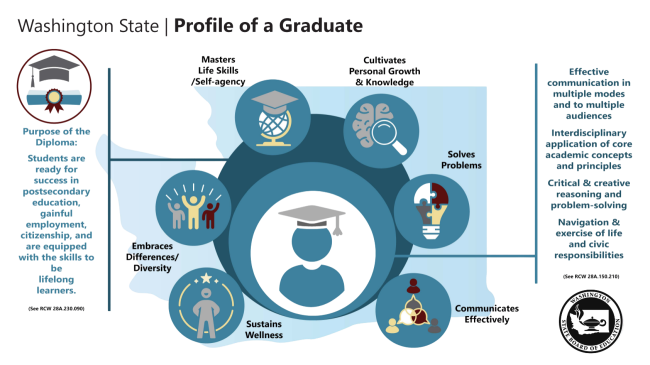Contact
Developed by the Mastery-based Learning Work Group, with support from the Board and valuable input from community stakeholders, the Profile of a Graduate outlines the essential knowledge, skills, and abilities our students should develop over the course of their K-12 educational journey.
The Profile builds on the foundation of core subject-based knowledge and enhances it by highlighting the development of essential crosscutting skills such as critical thinking, communication, collaboration, problem-solving, creativity, and empathy. The Profile serves as a guide and tool for improving the overall quality of education, ensuring that our students develop not only the knowledge they need, but also the abilities to adapt, collaborate, and excel in a rapidly changing world.
Learn more about how we collected feedback to align current graduation requirements to this Profile

Historical Context
"Profile of a Graduate" -- a guiding vision for our K-12 education system, developed with local input, that identifies the skills, knowledge, attributes, and competencies necessary for a successful transition to life after high school. The Washington State Profile of a Graduate will also be used to review state education policy, including graduation requirements. The Profile is featured in the recent Mastery-based Learning Work Group's 2021 report.
Reports related to graduation and student success:
- Data appendix from the Profile of a Graduate survey results
- The Root of Our Youth report on graduation requirements
- Road Map Project family listening session report
- Athena Group Report: Profile of a Graduate in Washington State
Profile of a Graduate Graphic:

English | Spanish | Arabic | Chinese (Simplified) | Korean | Marshallese
Punjabi | Russian | Somali | Tagalog | Ukrainian | Vietnamese
Washington law (RCW 28A.230.090) states that the purpose of a high school diploma is to declare that a student is ready for success in postsecondary education, gainful employment, and citizenship, and is equipped with the skills to be a lifelong learner. The Profile of a Graduate will help us to realign our focus to the areas that are most important or that have not been emphasized in school.
Examples from other states:
"Knowing how to learn" and "work ethic" are just some of the skills highlighted in South Carolina's Profile of Graduate. “Technical knowledge (content knowledge)” and “productive workplace skills” are featured in Virginia’s. Wyoming’s graduates must be “curious, kind, and ready to work hard to make their community a better place.”
Other district examples:
Glenbard (school district in Illinois) graduates "embrace diversity" and are "self empowered." In Clayton (school district in Missouri), their Profile calls for a graduating senior to display "cultural competency" and "self-actualization."
Creating these state-wide visions is impossible without community input, especially without feedback from our passionate partners, leaders, students, and educators in the field.

